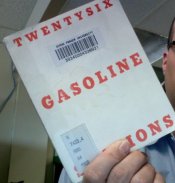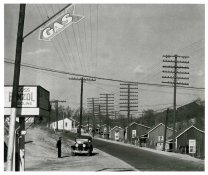Thanks to the wonders of interlibrary loans, I was able to get through my university a copy of Ed Ruscha's seminal anti-photobook, TWENTYSIX GASOLINE STATIONS (1963). The edition I borrowed is the 1969 reprint, which is still exceedingly expensive to buy from a dealer.

It's a teeny paperback, published on letter paper, and the halftone quality is about the same as your usual paperback. The subject is, appropriately, a series of pictures of 26 different gasoline stations. Everything conspires to make you think about the banal and the unimportant, until you actually look at the photographs. For this, I will refer you to all the images that are already somewhere else on the internet (just google them).
It's hard not to notice the strength of composition, and the little details that keep the picture together. Sometimes the shadow of the photographer is what was needed to hold the composition together, other times it's the perfect alignment of electricity poles with gas pumps. If you know Walker Evans, this is already familiar territory.
Yet it's difficult to get exactly what kind of statement this is making. Evans was making multi-layered, poetical statements, but Ruscha seems to be having more fun, while at the same time be really looking for the zero degree of meaning, even the mocking kind that says "you're really looking at a picture of gas stations, seriously, look at yourself!" The sequence alternates between single images and double-page spreads, day and night shots (which make a strong conceptual statement: why would we believe this is really an Enco in New Mexico when we can't recognize it?). Not exactly a typology, not a road trip either (for that see Jeff Wall's Landscape Manual instead).
In fact, I think it's probably best explained by a subsequent artist--an anachronism in a way, but not when you consider art as a dialogue--Stephen Shore. Both are formalists and conceptualists (pictures can be explained by their formal research, or by the idea behind their making), and both make tableau out of the non-picturesque. While the Shore of Uncommon Places has a more heightened need for aesthetic satisfaction than Ruscha, the earlier one of American Surfaces shared the low-tech, limited-means, conceptual and minimal style of Ruscha (no, I won't say snapshot!).
It's an intriguing book, and it preserves a fair amount of mysteries, the least insignificant of which really is indeed "why am I looking at gas stations again?"

It's a teeny paperback, published on letter paper, and the halftone quality is about the same as your usual paperback. The subject is, appropriately, a series of pictures of 26 different gasoline stations. Everything conspires to make you think about the banal and the unimportant, until you actually look at the photographs. For this, I will refer you to all the images that are already somewhere else on the internet (just google them).
It's hard not to notice the strength of composition, and the little details that keep the picture together. Sometimes the shadow of the photographer is what was needed to hold the composition together, other times it's the perfect alignment of electricity poles with gas pumps. If you know Walker Evans, this is already familiar territory.
Yet it's difficult to get exactly what kind of statement this is making. Evans was making multi-layered, poetical statements, but Ruscha seems to be having more fun, while at the same time be really looking for the zero degree of meaning, even the mocking kind that says "you're really looking at a picture of gas stations, seriously, look at yourself!" The sequence alternates between single images and double-page spreads, day and night shots (which make a strong conceptual statement: why would we believe this is really an Enco in New Mexico when we can't recognize it?). Not exactly a typology, not a road trip either (for that see Jeff Wall's Landscape Manual instead).
In fact, I think it's probably best explained by a subsequent artist--an anachronism in a way, but not when you consider art as a dialogue--Stephen Shore. Both are formalists and conceptualists (pictures can be explained by their formal research, or by the idea behind their making), and both make tableau out of the non-picturesque. While the Shore of Uncommon Places has a more heightened need for aesthetic satisfaction than Ruscha, the earlier one of American Surfaces shared the low-tech, limited-means, conceptual and minimal style of Ruscha (no, I won't say snapshot!).
It's an intriguing book, and it preserves a fair amount of mysteries, the least insignificant of which really is indeed "why am I looking at gas stations again?"









